
The original anti-revisionist impetus of the first wave might have ultimately stalled if it had not been rejuvenated by the second wave of activism fuel by the radicalised youth. These were drawn from a number of sources – student members of the Revolutionary Socialist Students’ Federation (RSSF), youth from the Young Communist League (YCL), and activists who were radicalized in the Schools Action Union (SAU) – all determined to form a revolutionary party. The YCL was the youth group of the CPGB. The RSSF was a radical national student group launched in June 1968 to unite revolutionary-minded students across the UK. The SAU was formed in London in January 1969 at a meeting attended by members of the Free Schools Campaign, Secondary School Students Union and various regional groups. The SAU’s basic demand was for students to have a say in how schools were run. The SAU was not a Marxist-Leninist group, although members self-consciously involved themselves in what they regarded as a movement of revolutionary youth, describing themselves as Maoist or anti-revisionist Marxist-Leninist.
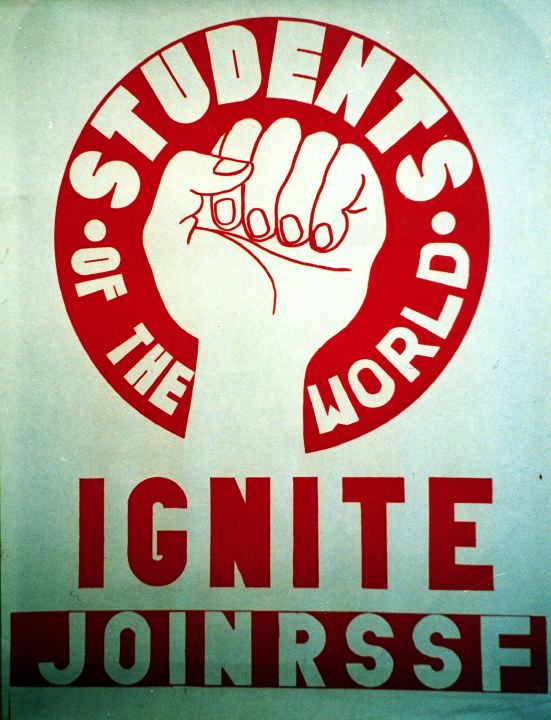
In the YCL, any challenge to the CPGB “Party line” were criticised as sectarian and dogmatic, and the heavy-handed manner in dealing with differences fuelled discontent in small pockets throughout the organisation. One London branch, the St. Pancras YCL, was unusual in that its leading members and activists considered themselves opponents of the British Road to Socialism. They were to form the nuclei of the Camden Communist Movement in 1967 and go on to participate in a succession of Marxist-Leninist organisations including the Joint Committee of Communists (JCC) and the Revolutionary Communist League of Britain (RCLB).
The key London Branch of RSSF in particular proved to be a rich source of Maoist activists. Organisations like the Revolutionary Marxist-Leninist League (RMLL), led by Manchanda, one of those charismatic characters that populated the margins of student Maoist organisations in England, drew many of its members from the RSSF. Its off-spring include the Association of Communist Workers, launched in 1969 and led by law lecturer Harpal Brar (who later would found the Communist Party Great Britain (Marxist-Leninist)) Edward Davoren, an RMLL activist who broke with the group in August 1969 went on to lead the Irish National Liberation Solidarity Front that published Irish Liberation Press and had at its core the Communist Workers League of Britain (Marxist-Leninist) that publicly emerged in 1972-73.
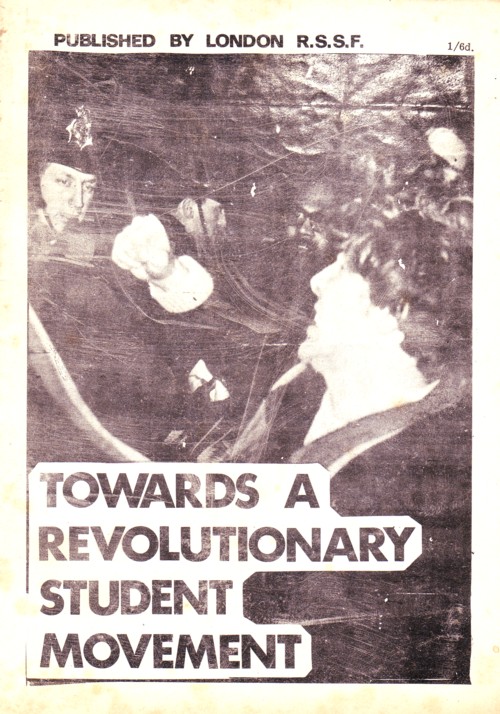
The main point is that the Maoist organisations of the second wave were consciously created in a process that saw the ranks of those expelled from the CPGB for their anti-revisionist politics reinforced by politically active students that were too Marxist for the YCL and numerous activists radicalised by events on the international scene, particularly the Cultural Revolution in China and the wars of resistance fought in Vietnam and elsewhere in the Third World. There was an enthusiasm and a desire to change the world for the better. By 1968, the movement was dominated by radicalised petty-bourgeois youth and intellectuals eager to “make revolution”.
The drive to form a new Party resulted in the formation of the Communist Party of Britain (Marxist-Leninist) (CPB (ML)) in Easter 1968, Led by a former executive member of the Communist party and the Amalgamated Union of Engineering Workers (AEU) leader, Reg Birch. A few hundred strong at its height, the CPB (ML) had the advantages of a recognised trade union leader as its founder, geographical representation across the country, and a working class base. It produced a newspaper, The Worker, starting in January 1969 and enjoyed international recognition by both Albania and China.
The CPB (ML) seemed attractive to those looking for a serious political force: it offered the opportunity to rectify the stunted development of the movement by providing an organisation organically connected to the working class in Britain. With a pedigree of both trade unionism and Communist Party activity, Chairman Birch offered the possibility of gathering the best forces of the Marxist-Leninist movement around the standard he had raised. Many wanted a unified centre to build the movement around; after all, Britain’s Maoist were a minority tendency in the creative political constellation of a British Left swamped by revisionists and Trotskyists. Those disgusted with the squabbling that seemed to dominate the activities of many anti-revisionist circles looked forward to the opportunity for serious political work in trade unions and campaigns directed at winning working class support in the appropriate Leninist fashion.
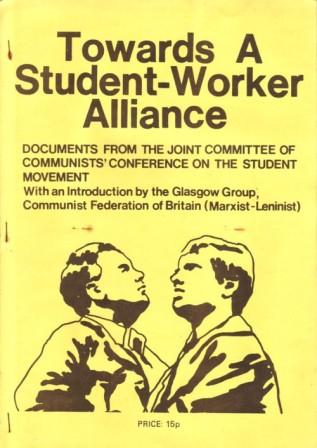
Nonetheless, the CPB (ML) had its critics. In September 1969 the loose affiliation of groups and activists in and around the Joint Committee of Communists that had coalesced out of activists from the YCL, students and a sprinkling of veteran anti-revisionists, formed the Communist Federation of Britain (Marxist-Leninist). The CFB (ML) was essentially the reconstituted JCC, still politically stunted by its insistence on organising as a federation of groups. As a result, it lacked a coherent leadership to weld the organisation into an interventionist focused force. It published a monthly newspaper Struggle starting in December 1969 and a theoretical journal the Marxist-Leninist Quarterly.
Throughout the 1960s, Britain’s Maoists were incapable of acting as a unified movement. Certainly the use of the term movement is an accurate one, reflecting the continuing existence and even proliferation of small active groups. All too often, the smaller the group, the more introspective its members were and too much of the movement’s energy and effort was devoted to bitter interminable polemics directed at “comrades” in other organizations.
| Index of organizations in this section (by alphabetical order) |
| Communist Federation of Britain (Marxist-Leninist) |
| Communist Party of Britain (Marxist-Leninist) |
| Communist Unity Organization (M-L) – Communist Unity Association (M-L) |
The Family Tree of the Anti-Revisionist Movement in the UK [Chart]
The Rise and Fall of Maoism: the English Experience by Sam Richards
Remembering the Maoist Movement in Britain by Neil Redfern
Claudia Jones’ Communism by Carole Boyce Davies
Abhimanyu Manchanda Remembered
The Manchanda Connection – A Political Memoir by Diane Langford
Whither China? by R. Palme Dutt
From Marx to Mao Tse-tung: A Study in Revolutionary Dialectics by George Thomson
Capitalism and After: The Rise and Fall of Commodity Production by George Thomson
* * *
From Camden Communist Youth Movement

Progressive· British Workers, Students and Asian, African, Latin American Progressives in Britain Cherish Mao Tse-tung’s Thought. [Hsinhua News Agency, March 21, 1968]
Revolutionary Socialist Students’ Federation Manifesto [1968]
WE ACCUSE...! Young Communists Denounce Leadership
THE SCHOOLS STRIKE! S.A.U. leads the way
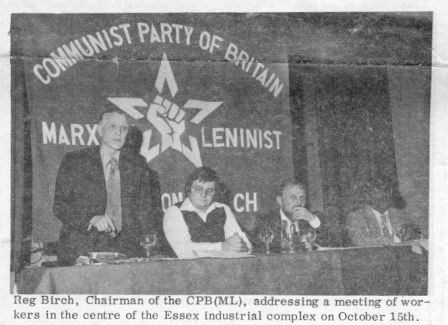
In September 1967, after a visit to China, the British Marxist-Leninist Organisation was launched at Conway Hall at a meeting chaired by Reg Birch. From the very beginning, there was a general belief that his leadership of the movement was in the natural order of things. Premises were obtained in Tufnel Park, North London for a party centre, which also housed Bellham Books, and work began.
April 1968 saw 70 delegates come together to form the Communist Party of Britain (Marxist-Leninist). A public meeting in June unveiled the CPB (ML), chaired by Chairman Birch who led the 25 member Central Committee. “We will form for the first time a Marxist-Leninist party based on the working classes of Britain,” Reg informed The Times newspaper, adding, “There will be no intelligentsia on the party’s governing body.” Not surprisingly the CPB (ML) did not produce a theoretical journal; instead, it issued The Worker newspaper and pamphlets as things accessible for workers. The theoretical poverty of the organisation was well developed and its rhetoric disturbingly familiar for what was, at the time, the largest Maoist organisation in Britain. In November 1971, The Worker had a front-paged headline that read: “USSR 1917, ALBANIA 1944, CHINA 1949, BRITAIN NEXT?”
Revolution in Britain would come about through the ideological clarity gained through the kinds of struggles others denigrate as “economic”; trade unions were “schools for revolutionaries”, organs of mass struggle. The “two-class analysis” adopted by the Party in 1971 argued that in “Britain the oldest and most proletarianised of capitalist countries, all the intermediate classes left over by feudalism have been absorbed into the proletariat, as has the peasantry.” White collar workers were workers, none of this middle class fiction, please. As a class analysis to guide revolutionaries it had no use value!
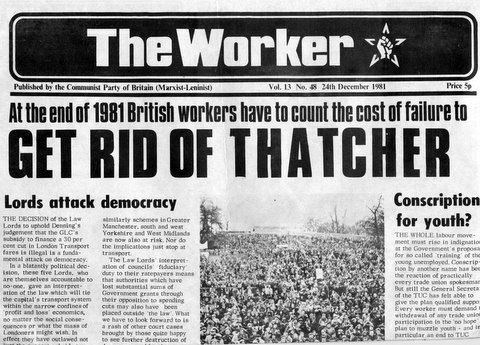
The chauvinism of the CPB (ML) seemed to be always present in the leadership of the organisation. At a national conference of the CPB (ML) in January 1970, Reg Birch, chairman–founder said that, “We are the first Party started by the proletariat, however few... Our paper The Worker is sought out by every Marxist-Leninist Party in the world and our party enjoys relations of fraternal equality with China and Albania.” (The Worker, February 1970).
Those fraternal ties were subject to change towards the end of the decade and after a period of shifting allegiances; the CPB (ML) ultimately dropped any sympathy for the Maoist precept of the centrality of Third World based struggles to the destruction of imperialism. Initial solidarity with Albania in its criticism of the “Three Worlds Theory” along the lines of The Worker headline, “A Single World Divide By Class” led to a re-assessment of China’s general political orientation, with The Worker describing “China’s Capitalist Chaos” by February 1979.
The honeymoon with Albania faltered, however, when the CPB (ML) were expected to criticise trade unions and set up revolutionary oppositions to their leadership. Reg Birch may have retired from the General Council of the Trade Union Congress but such “slanders” were unacceptable. The relationship with Tirana waned.
The CPB (ML) edged towards a position that the Soviet Union “in spite of past revisionist vagaries, was the ally of working people under attack... the only power sympathetic to the aspirations of genuine liberation movements anywhere”. So The Worker declared in 1982: “Attack on USSR is war on workers” The Party was back in the revisionist camp.
The CPB (ML) reaction to the election of the Tory government of Margaret Thatcher in 1979 shifted the Party to a position that foresaw the de-industrialisation of Britain in order to destroy the oldest working class in the world. Insular and self-delusional positions that ignored the experience and achievements of other Marxist-Leninists as not applicable to Britain’s “uniqueness” are evident in many of the CPB (ML) campaigns and publications. Meanwhile, other UK Marxist-Leninists often focused their criticism on the CPB (ML)’s economism as in an internal criticism produced by the 1976 breakaway Communist Workers Movement, entitled, The “Absolute” Decline of the CPB (ML).
In the aftermath of the Miners’ Strike in the mid-1980s the CPB (ML) was even shriller in spelling out the nightmare that it foresaw:
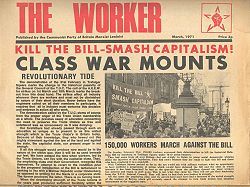
“The prospect now before us is appalling. We have the hag-ridden Thatcherite nightmare of an impoverished, de-industrialised Britain, dependent on the fickle whims of the tourist trade, our sons as waiters and our daughters as prostitutes, a dependency of the USA – a Puerto Rico without the sun.” (CPB (ML), Protracted Struggle and the Working Class, May 1986)
Reg Birch stepped down from his leadership position in 1985. The party survived his death in 1994, maintained and re-launched on the Internet, producing the same “Save Britain” politics through its monthly magazine, Workers.
English Maoist is Influential Unionist by Victor Riesel
Memorandum Submitted to the Provisional Committee of the British Marxist-Leninist Organisation by A. Manchanda
Economism or Revolution? A Critique of the Communist Party of Britain (M-L)
Important Statement on Class by The New Voice [U.S.]
Unity Is The Aim of Struggle by the Communist Federation of Britain (Marxist-Leninist)
“Anti-Revisionist Notes” and “Letter to the Secretary of the Birmingham Branch of the CPB(ML)” by G. N. Henshaw
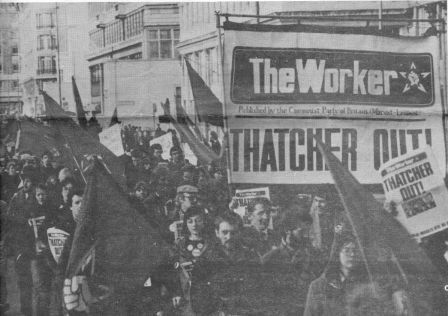
CPB (M-L) Goons Attack Communist Workers by the Communist Workers League of Britain (Marxist-Leninist)
Birch No Longer Part of the Marxist-Leninist Movement! by the Revolutionary Communist League of Britain (Marxist-Leninist)
Reg Birch – a life remembered by Ken Ruddock
Obituary: Reg Birch by Terry Pattinson
The Nationalism of the CPBML by Lalkar
Mountain Wrongholdism by Alexei Sayle [from the book, Thatcher Stole My Trousers]
Immediate Tasks for the British Marxist-Leninist Organisation
Statement by the Communist Party of Britain (M-L) [Peking Review, #39, 1968]
Labour Govt. – Workers’ Enemy!
C.P.B.M.L. Secretariat statement on intensification of racialism by the British ruling class
Letter to new candidate member
Notes on the Struggle of the Working Class in Britain
The Working Class, Past, Present & Future?
World’s People Warmly Acclaim Chairman Mao’s Solemn Statement [Peking Review, #25, 1970]
From Secretariat of Communist Party of Britain (Marxist-Leninist) [Peking Review, #43, 1970]
CPB (M-L) Delegation to Albania
British Communist Party (M-L) Delegation in Peking [Peking Review, #1 & #2, 1971]
The British Working Class and its Party
Burning Questions for Our Party
Guerrilla Struggle and the Working Class
Unemployment – war against the workers
White Collar – a myth destroyed, a class made stronger
Comrade Reg Birch Leaves Peking for Home [Peking Review, #23, 1973]
The Definitive Statement on the Internal Polemic, 1972-1974 [on classes]
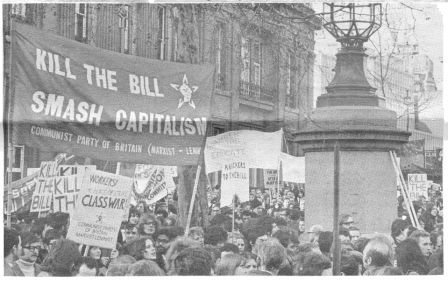
Editorial: 1975 – A Critical Year for the Working Class
The CPB (ML) – For the Liberation, Economic Development and Defence of Britain
Letter From Chairman Birch of Central Committee of Communist Party of Britain (M-L) [on the death of Mao] [Peking Review,#45, 1976]]
Britain’s Wealth Is Its People
A barbaric system which has outlasted its time: Capitalism Must Go
Britain Could be a ’desert’ of wealth
The Economics of Genocide. Part I: An Historical Introduction
The Economics of Genocide. Part 2
The Economics of Genocide. Part 3: Genocide – No!
The Special Nature of British Trade Unions A speech by Reg Birch
Congress ’85: Report of the Seventh Congress
Protracted Struggle and the Working Class
Britain: One Nation, One Culture
Changing Gear [leaflet]
Class, Country and Control [Document from the 12th Congress, 2000]
Peace, jobs, power [political statement from the 13th Congress, 2003]
The Future is Ours [Political Resolution of the 14th Congress, 2006]
Congress 2012 [Document from the 16th Congress, 2012]
[Back to top]
The Communist Federation of Britain (Marxist-Leninist) (CFB (ML)) emerged in 1969 from the attempt of the Joint Committee of Communists to oppose the claim of the CPB (ML) to be the leading force in the Marxist-Leninist movement. The CFB (ML)’s founding document, first published in the summer of 1969, Marxist-Leninist Movement in Britain, Origins & Perspectives had argued that “no strategy exists yet for socialist revolution in Britain” and was critical of the CDRCU, and “the self-styled ‘Communist Party of Britain (ML)” as “generals without soldiers.” Although smaller in size than the CPB (ML), the Federation united local groups from several major industrial cities; Birmingham, Bradford, Coventry, Glasgow, Liverpool and Sheffield, while in Cambridge, the University provided the group’s membership.
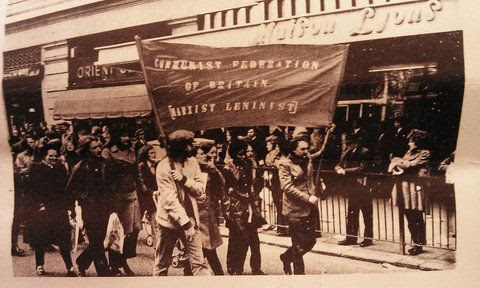
In contrast to the democratic centralist structure of the CPB (ML), the CFB (ML) adopted a consensus approach of local groups working together, out of which a political leadership would hopefully emerge. So successful was this strategy that the organisation issued leaflets at the 1974 general election that provided two contrasting positions on whether to support the Labour Party at the ballot box.
The CFB (ML) was politically unstable but produced a newspaper Struggle with a political line that varied from one issue to the next according to the mood of the editor, and a theoretical journal, The Marxist-Leninist Quarterly that was later charged with “intellectualism” by its successor organisation. Individualism was a dominant characteristic of the membership: the chairman of the CFB (ML) resigned to pursue a successful academic career in criminology. The arguments within the organisation were eventually resolved (after it had become virtually paralyzed) when, in March 1976, at its Third Conference that the CFB (ML) resolved to build a “nucleus of leadership in what had been a very ultra-democratic organisation”. At this point, the Glasgow group, and Coventry group associated with Dick Jones, left the CFB (ML).
The differences in the JCC and Camden Communist Movement
Revisionism and the British Anti-Revisionist Movement by T.M.
Report of the Special General Meeting, December 1973/February 1974
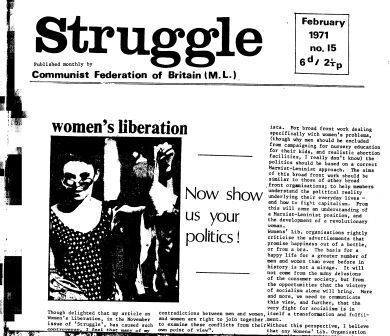
Criticism of the Programme of the W.P.P.E.
The Communist Federation of Britain (Marxist-Leninist)
Election Message: Don’t Vote – Organize
Letter from Workers Broadsheet and Editor’s Reply
Women’s Liberation – A Comment
Women’s Liberation – Now Show Us Your Politics!
What is a Marxist-Leninist Party?
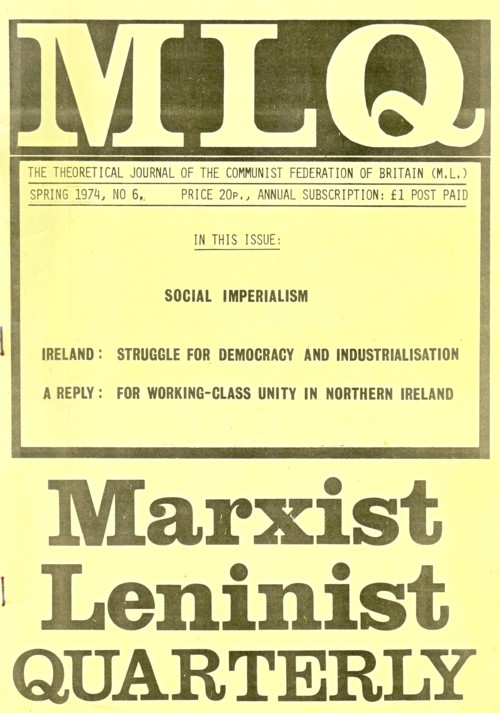
Group Autonomy Discussion [collection of unpublished internal documents]
Peaceful Coexistence and Proletarian Internationalism by V. P.
On the origins and development of revisionism in the Soviet Union by M.F.
Notes on the Labour Aristocracy in Britain (Part I) “Imperialism and Opportunism” by Sam Mauger
Notes on the Labour Aristocracy in Britain (Part II) by Sam Mauger
Discussion: The Origins of Revisionism in the USSR by N.R.
The Strategy for a Socialist Revolution in Britain by Sam Mauger
Concise statement of socialist struggle line policy for Northern Ireland
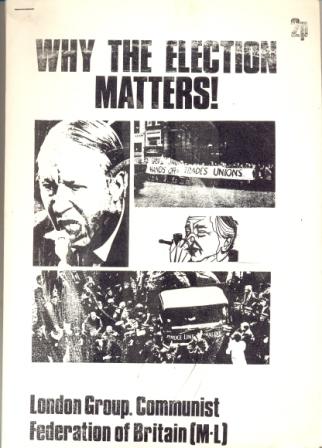
Marxist-Leninist Quarterly, No.4 [Spring 1973]
Second Special General Meeting
Women’s Liberation: Critical Notes on Selma James’ Pamphlet by the Women’s Group (CFB-London)
On Practice by J.C.
Ireland–Struggle for Democracy and Industrialisation by H. M.
Letter: Whatever Happened to Lin Piao?
Introduction to the Proposed Document on the International and National Situations
Political Notes: Expose the “Reformists of Every Stripe and Hue” by Dick Jones
CFB Policy statement on Ireland (Two Resolutions)
On the “Usefulness” of “ECONOMICS OF PARTITION” by G.M.
Letter to the Editor of Marxist-Leninist Quarterly by E.K.
SM’s reply to criticism of his ’style of inner party struggle’ [internal correspondence]
Why the Election Matters! by the London group, Communist Federation of Britain (M-L)
DOWN WITH THE DIVERSIONARY ELECTION, SPREAD THE STRIKES! by the Glasgow group, Communist Federation of Britain (M-L)
* * *
Social Democracy – A reply to DJ
The Soviet Economy and the Restoration of Capitalism by P.J.
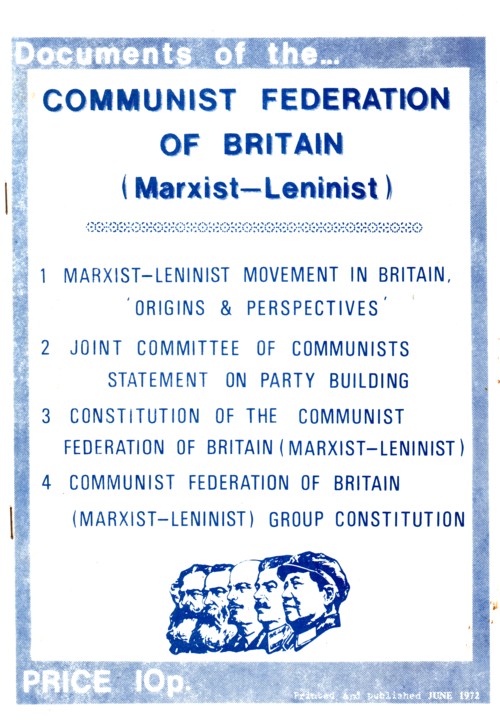
Review Article: “Workers Against the Monolith”, I. Birchall
London Group Report to the Third Federation SGM [internal document] Liverpool Resolutions to the Third Federation SGM [internal document] Self-Determination – not “TOM-Determination”
Neither Adventurism nor Opportunism – A Reply to SM Criticism of the CFB Statement on the World Situation A Criticism of Erich Farl’s Article ’Is the USSR an Imperialist Country?’ by P.T. Build the Revolutionary Communist Party To Lead The Revolution
On Relations Between Marxist-Leninist Organizations in Britain
Lower and Deeper into the Proletariat
Nationalisation and the Crisis of British Imperialism
National Committee Policy Statement on Nationalisation
Nationalisation by D.J. and D.S. The Soviet Union is a Social Imperialist State!
Criticism of the CFB Resolution on Ireland
Boldly Combat Social Democracy in the Struggle to Overthrow Capitalism [internal document] Reply to the Resignation letter of the Coventry Group of the C.F.B. (M-L)
Combat Intellectualism to Transform the Class Stand of the CFB(ML)!
Active Ideological Struggle Is The Key Link In Party Building
The Principal Contradiction in the Organization [internal document] Combat Women’s Oppression: Mobilise Women for Socialist Revolution Call to the British Marxist-Leninist Movement "Revolution" (Britain): The Central Task Is to Establish a Revolutionary Communist Party [Peking Review, #29, July 15, 1977] Grasp Firmly the Mass Line in Base-Building The ’British Road’: An Opportunist Path to Counter-Revolution Transform the Family into a Fighting Unit of the Proletariat! [Back to top]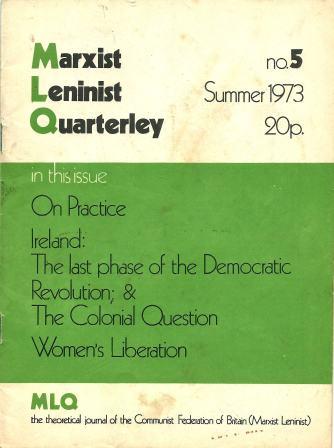
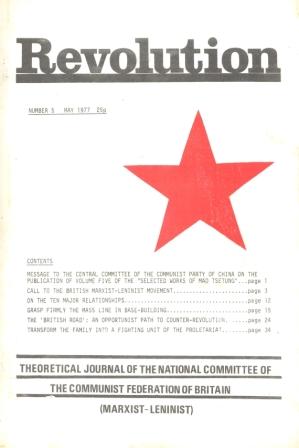
Periodicals
The Communist Unity Organisation (Marxist-Leninist) (CUO) was established in 1971 by members of the London and Grimsby groups of the CFB (ML) when two members of the London branch were suspended after a long period of struggle within the CFB (ML) over questions of line, ideology and organisational form and the lack of progress in the CFB (ML) in establishing a democratic centralist organisation. The focus on these issues was to dominant the political life of the CUO.
In 1973 the CUO became the Communist Unity Association (Marxist-Leninist) (CUA) as the result of a fusion with the equally small Marxist-Leninist Workers Association. The new organisation still consisted of two branches, one in London and the other in Grimsby.
The CUA produced Workers’ Unity and a number of well-regarded polemical theoretical pamphlets. Particularly influential was “Imperialism and the struggle for a Revolutionary party”; a critique of the Communist Party of Britain (ML) called “Economism or Revolution?;” and “Broad Fronts and United Fronts…an analysis”.

Workers’ Unity consisted at first of a single, and subsequently a 2 and then a 4 duplicated A4 paper. 235 issues were published, ceasing in July 1977 when the unity of the CUA and the CFB (ML) in the newly formed Revolutionary Communist League of Britain (RCLB) was announced. Although it had only nine members – including Mike Earle and Wilf Dixon – at the time of unity, many of CUA’s leading members were prominent in the leadership of the new organisation.
An internal assessment of the RCLB, written for its contentious History Conference of 20th April 1980, judged:
“The CUA was committed to both Party building and mass work. In general its political stand combined adherence to the fundamental principles of Marxism-Leninism with an objective assessment of the actual situation better than any other Marxist-Leninist group in the early 70’s.”
This was a tacit admission that, in the original split of 1971, it was the minority that had been in the right. Certainly former CUA members had a greater respect and political capital within the early years of the RCLB because of that political history. The RCLB’s ’Draft Internal Statement’ noted that the “CUA contributed substantially to the process of forming the Manifesto of the RCL, particularly in the emphasis on the imperialist nature of Britain and the need to combat opportunism.”
Some Implications of the United Front Policy: comments on a document by the Communist Unity Organisation by the Association for the Realisation of Marxism
Irish Communist Organisation and China
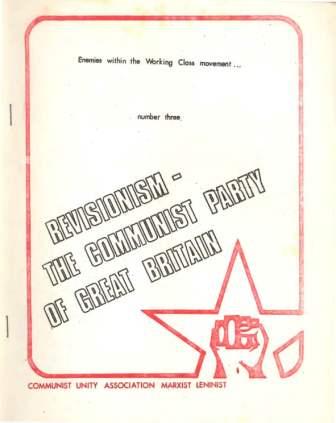
The Struggle in Ireland, What British Workers Should Know
Economism or Revolution? A Critique of the Communist Party of Britain (M-L)
Broad Fronts and United Fronts. An Analysis
Racism and the Danger of Fascism
Enemies within the Working Class Movement... #2: Social Democracy–The Labour Party
Enemies within the Working Class Movement... #3: Revisionism–The Communist Party of Great Britain
Imperialism and the Struggle for a Revolutionary Party
CUA-CFB Unite in Revolutionary Communist League
[Back to top]